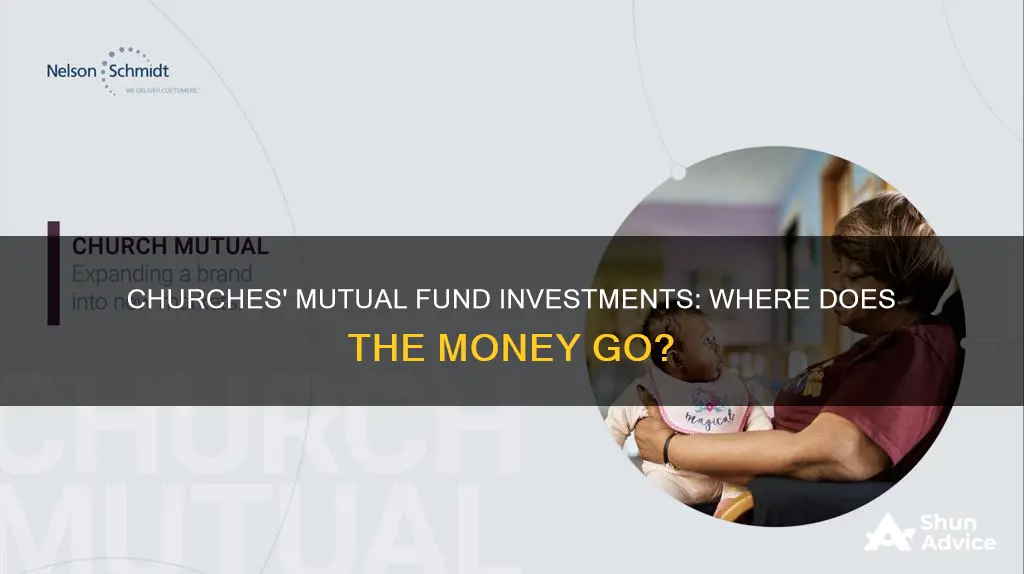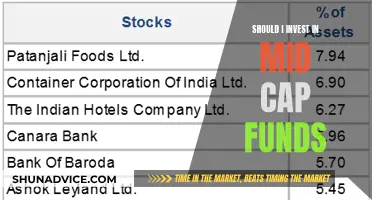
Faith-based investing is a type of investment philosophy that aims to maximise investor returns while aligning with an individual's religious values. While churches do not sell securities directly to investors, faith-based investors can choose to invest in mutual funds that adhere to their religious beliefs. These funds typically avoid investing in companies or industries deemed immoral or contradictory to their faith, such as alcohol, tobacco, weaponry, adult entertainment, and gambling. Faith-based investing is not limited to a particular religion and includes Catholic, Protestant, Islamic, and Jewish investment strategies.
| Characteristics | Values |
|---|---|
| Investment types | Mutual funds, ETFs, Investment certificates, Bonds, Stocks |
| Investment goals | Maximise investor returns, generate returns, do good |
| Investment strategies | Negative screening, positive screening, values-based investing, socially responsible investing, Biblically Responsible Investing, faith-based investing, ESG investing |
| Investment restrictions | Abortion, birth control, pornography, gambling, tobacco, alcohol, weapons, adult entertainment |
| Investment minimums | $250, $500, $1,000, $250,000, $0 |
| Investment terms | 1-5 years, 3 months-10 years |
| Investment risks | Economic, interest rate, geopolitical |
What You'll Learn

Mutual funds that practice faith-based investing
Faith-based investing allows individuals to generate returns by choosing investments that align with their religious beliefs and values. While it does not involve the purchase and sale of stocks in religious organisations, faith-based investing is similar to other types of investment philosophies in that it aims to maximise investor returns.
Faith-based investors often choose investment professionals and vehicles that align with their religious values. This strategy is also called values-based investing.
LKCM Aquinas Fund
The LKCM Aquinas Fund follows the socially responsible investment (SRI) guidelines set by the US Conference of Catholic Bishops. It aims to maximise investor capital in the long term with Catholic investing principles in mind. The fund has a five-year average annual total return of 13.78% as of 31 December 2023.
GuideStone Funds
GuideStone Funds offers investments that are socially screened and based on Christian values. The company serves a range of investors, from institutional to individual. Its offerings include US and international equities, as well as fixed income. As of 30 June 2023, the firm had $16.7 billion in assets under management, making it one of the largest faith-based fund managers in the United States.
New Covenant Funds
New Covenant Funds makes investments that are consistent with the social-witness principles adopted by the General Assembly of the Presbyterian Church (USA). The firm avoids investments in companies involved in gambling, alcohol, and firearm-related issues.
Amana Mutual Funds
Offered through Saturna Capital, Amana Mutual Funds seeks to protect against inflation by making long-term equity investments. It avoids bonds and other interest-bearing securities, in alignment with Islamic or Sharia investment principles, which prohibit investments that pay interest.
Ave Maria Mutual Funds
Ave Maria Mutual Funds is a US mutual fund family that targets clients interested in financially sound investments that do not violate certain religious principles of the Catholic Church.
Church Investors Fund
The Church Investors Fund offers a variety of investment options, including term certificates, foundation certificates, IRAs, Coverdell Education Savings Accounts, revocable charitable gifts, building fund certificates, and ministry fund certificates. Investments in the Church Investors Fund help build new sanctuaries, classrooms, and fellowship halls, as well as renovate current facilities for churches.
Mutual Fund Investing: Dave Ramsey's Guide for Beginners
You may want to see also

Faith-based funds that invest according to religious principles
Faith-based funds invest according to a set of religious principles. Faith-based investing does not mean sacrificing profits. Faith-based investors want to generate returns by choosing investments that align with their religious beliefs and values. Faith-based funds have many of the attributes that investors would ordinarily seek in a fund.
Faith-based investment strategies often focus on ethical and socially responsible investments. The majority of faith-based styles exclude investment in companies that are deemed immoral, such as alcohol, tobacco, and weaponry companies.
Christian-oriented funds
Beneath the broad umbrella of Christian-oriented funds is Eventide Gilead (ETGLX). Managers Finny Kuruvilla and David Barksdale believe work done for others is blessed. They invest in firms that are sensitive to shareholders, customers, employees, communities, and the environment. They avoid companies that profit from alcohol, gambling, and other potential addictions. The fund tilts toward midsize firms and has delivered strong performance since its launch in 2008.
Catholic funds
LKCM Aquinas Value (AQEIX) follows the guidelines of the U.S. Conference of Catholic Bishops. The fund, which owns mostly large-company stocks, avoids firms that deal with abortion, birth control, pornography, and certain weapons. The fund's manager, Paul Greenwell, focuses on companies that consistently generate a high return on invested capital. Over the past ten years, Aquinas Value has delivered an annualized return of 8.3%, placing it in the top 22% of its peers.
Ave Maria Rising Dividend (AVEDX) takes a slightly different approach to investing according to Catholic values. The fund avoids companies with ties to abortion or pornography and has a zero-tolerance policy towards them. The fund's co-managers, George Schwartz and Richard Platte, search for businesses with rising sales, earnings, and cash flow, indicating a potential increase in dividends in the future. The fund has helped smooth out market swings and has delivered solid long-term performance.
Ave Maria Mutual Funds is a U.S. mutual fund family that targets clients interested in financially sound investments in companies that do not violate certain religious principles of the Catholic Church.
Islamic or Sharia-compliant funds
A number of funds follow the principles of Islamic, or Sharia, finance, including Amana Income (AMANX). Sharia bars investments in companies involved in alcohol, pork, gambling, pornography, or tobacco. It also requires investors to avoid interest. The fund's manager, Nicholas Kaiser, and deputy manager, Scott Klimo, eliminate banks and companies with high debt. They then look for companies worldwide that offer a high dividend yield and can increase their dividends over time. The fund has held up well during downturns due to its focus on low debt and zero stake in banks.
Jewish-oriented funds
Mutual funds that follow Jewish investment strategies provide multiple interpretations of Jewish investing. For example, the iShares MSCI Israel ETF (EIS) is a non-diversified fund that invests primarily in Israeli securities tracking a market capitalization-weighted index of the Israeli equity market. It had net assets of $131.4 million as of January 18, 2024.
Protestant-oriented funds
GuideStone Funds provides investments that are socially screened and based on Christian values. The company serves investors of all kinds and offers a range of fund offerings, including U.S. and international equities and fixed income. As of June 30, 2023, the firm had $16.7 billion in assets under management, making it one of the largest faith-based fund managers in the United States.
New Covenant Funds makes investments consistent with the social-witness principles adopted by the General Assembly of the Presbyterian Church (USA). The firm avoids investments in companies involved in gambling, alcohol, and firearm-related issues.
Fixed Income Funds: Where Are Your Investments Going?
You may want to see also

Faith-driven mutual funds and ETFs
- Sovereign's Capital: This fund goes beyond negative screening and invests in companies with strong cultures that empower employees to thrive. They invest in publicly traded companies led by faith-driven CEOs, aiming for both performance and impact.
- Eventide Asset Management, LLC: Based in Boston, Eventide pursues investments that create compelling value for the global common good. They offer high-performance investments while adhering to their vision of "investing that makes the world rejoice."
- Crossmark Global Investments: Crossmark offers Steward Mutual Funds, which use a unique screening process. This process ensures that investors receive competitive returns without compromising their personal values. Crossmark has a long history of specialising in values-based investing strategies.
- Guidestone Financial: With a commitment to serving those who serve the Lord, Guidestone provides financial solutions to ministry-minded individuals and organisations. They aim to promote financial, health, and spiritual wellness while honouring Christian values.
- Timothy Plan: With a pro-life and pro-family screening standard, Timothy Plan was the first to introduce Biblically Responsible Investing. They refuse to invest in any company that violates their moral filters, ensuring that their investors' money is used for Kingdom Impact Investing.
- Praxis Mutual Funds: As the mutual fund family of Everence Financial, Praxis Mutual Funds helps individuals, organisations, and congregations put their faith into action through financial decisions. They believe that God calls us to consider the impact of our investments on others, just as much as we focus on financial returns.
- Inspire: Inspire seeks to invest in quality companies from both a financial and values-based perspective. They look for "best in class" companies in redemptive categories while carefully screening out businesses with activities against Biblical values.
- OneAscent Investments: OneAscent offers a range of Values-Based investment strategies, including Funds, Turnkey Models, Individual Strategies, and Retirement Portfolios. Their disciplined investment process is combined with a commitment to helping investors live according to their values.
These funds provide investors with the opportunity to align their financial decisions with their faith, knowing that their investments are making a positive impact while also aiming for competitive returns. It is important for investors to research these funds and consult with financial advisors to ensure that the funds match their specific values and investment goals.
Reporting Inherited Investment Funds: A Step-by-Step Guide
You may want to see also

Investment options for churches
Faith-based investing is a type of investment philosophy that aims to maximise investor returns while aligning with an individual's religious values. While churches do not sell securities directly to investors, there are several investment options for churches that wish to generate returns while adhering to their religious beliefs. Here are some options for faith-based investment strategies:
Mutual Funds
Mutual funds that practice faith-based investing make investment decisions based on a set of religious principles. These funds exclude investments that contradict their values, such as companies involved in the alcohol, tobacco, weaponry, gambling, or adult entertainment industries. Some examples of faith-based mutual funds include:
- LKCM Aquinas Value (AQEIX) – Follows Catholic values and avoids companies associated with abortion, birth control, pornography, and certain weapons.
- Ave Maria Rising Dividend (AVEDX) – Invests according to Catholic values, excluding companies with ties to abortion or pornography.
- Eventide Gilead (ETGLX) – Operates under Christian values, avoiding companies that profit from alcohol, gambling, and other potential addictions.
- Amana Income (AMANX) – Follows Islamic or Sharia principles, excluding companies involved in alcohol, pork, gambling, pornography, or tobacco.
Investment Funds
There are also dedicated investment funds that cater to faith-based organisations and offer various investment options:
- Church Investors Fund – Offers certificates with terms ranging from one to five years, as well as foundation certificates, IRAs, Coverdell Education Savings Accounts, and revocable charitable gifts.
- AGFinancial – Provides demand certificates and term certificates for churches, with competitive rates and funds that help other churches expand their ministries.
- Timothy Plan – Offers Biblically Responsible Investing through pro-life and pro-family filtering standards, ensuring that funds are not invested in companies contrary to Christian values.
- Sovereign's Capital – Invests in public companies led by faith-driven CEOs, seeking both performance and impact.
- Crossmark Global Investments – Provides Steward Mutual Funds, utilising a proprietary screening process that balances investment returns with personal convictions.
- Guidestone Financial – Serves ministry-minded individuals and organisations, offering financial solutions that promote financial, health, and spiritual wellness while honouring religious beliefs.
These are just a few examples of the many investment options available for churches. It is important to research and consult with financial professionals to find the best fit for your organisation's values and financial goals.
Unlocking Vanguard's Closed Funds: A Guide to Smart Investing
You may want to see also

Biblically responsible investing
Absolutely! Here is a detailed and direct response on 'Biblically Responsible Investing':
Investing is an important aspect of financial planning for any organization, and churches are no exception. When it comes to investing their funds, churches often seek options that align with their values and ethical beliefs. This is where Biblically Responsible Investing (BRI) comes into play. BRI is an investment approach that seeks to generate financial returns while also adhering to the principles and values found in the Bible.
At its core, BRI involves investing in companies and industries that do not contradict biblical teachings. This means avoiding businesses involved in activities that are considered sinful or harmful, such as alcohol, tobacco, gambling, pornography, or weapons manufacturing. BRI also encourages investing in companies that demonstrate strong ethical standards and have a positive impact on society.
One popular option for churches when it comes to BRI is mutual funds. Mutual funds are investment vehicles that pool money from multiple investors to purchase a diversified portfolio of stocks, bonds, or other securities. There are several mutual funds in the market that are specifically designed with biblical values in mind. These funds typically screen the companies they invest in, ensuring they meet certain ethical criteria.
When considering BRI mutual funds, churches should look for funds that align with their specific denomination or interpretation of biblical values. Different funds may have varying criteria for the companies they include or exclude. Some funds may focus on supporting businesses with strong environmental, social, and governance (ESG) practices, while others may prioritize companies that promote traditional family values or have a positive impact on the community.
It is important for churches to conduct thorough research before investing in any mutual fund. This includes reviewing the fund's performance history, fees, and investment strategy, as well as ensuring that the fund's values align with those of the church. It is also advisable for churches to consult with financial advisors or experts in BRI to guide them through the investment process and ensure their financial decisions match their biblical convictions.
By adopting BRI principles, churches can ensure that their investments are not only financially sound but also consistent with their faith and ethical beliefs. This approach allows them to be good stewards of their resources and to use their investments as a way to promote positive change and impact the world around them.
Maximizing Pension Fund Investments with 80CCC Contributions
You may want to see also
Frequently asked questions
Faith-based mutual funds are those that are aligned with religious values. They are similar to other investment funds in that they aim to maximise investor returns, but they differ in that they allow investors to make decisions that align with their religious principles.
Some examples of faith-based mutual funds for Christians include:
- LKCM Aquinas Value (AQEIX)
- Ave Maria Rising Dividend (AVEDX)
- Eventide Gilead (ETGLX)
- Steward Mutual Funds by Crossmark Global Investments
- Timothy Plan
- Praxis Mutual Funds
- Inspire
- OneAscent Investments
- Ave Maria Mutual Funds
Some examples of faith-based mutual funds for Muslims include:
- Amana mutual funds
- Iman Fund
Some examples of faith-based mutual funds for Jews include:
- iShares MSCI Israel ETF
Faith-based investing allows investors to put their money where their values are. It also allows investors to feel good about their investments and has a track record of being profitable.







